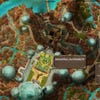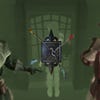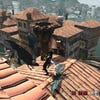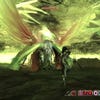Venetica
Venetian grind.
Venetica's combat runs along pretty simple lines. You can hammer the mouse button for quick, repeated attacks, which has its place against enemies low on health. But the art lies in chaining attacks. At the end of each swing, your weapon twinkles to let you know it's time to initiate the next swing. Levelling up your chain attacks is generally preferable, as it's harder for an enemy to slip in a combo-breaking strike between chained blows, as opposed to button-mash blows. This gives combat a kind of cadence which you begin to chase in every fight.
There's always a get-out clause with combat, and that's The Passage, the spell that lets you pop into the spirit realm. This removes you from enemy sight, and it's downright necessary when your back's to the wall and you have a group of three enemies attacking you simultaneously. It gives you a burst of health, and lets you reset the terms of the engagement from a more beneficial position.
Boss battles are a different kettle of fish. Each of the big cheese's lieutenants has two phases of combat: one based in the physical realm, and one based in the spirit realm. In time-honoured fashion, each requires a spot of pattern-recognition to defeat, and by and large, Deck 13 is fairly creative in what it throws at you. One of the bosses, an African Princess, appears in the spirit realm as a giant bird. After her initial aerial attacks are dealt with, she sheds a feather and a scale, which are used as a spear and a shield against her.
There's lots of character and creativity on show, and that keeps Venetica interesting right until the end. But there's also the kind of corner-cutting and lack of polish that speak of an under-budgeted game with high aspirations. This is a tremendous shame, as it devalues the experience in a constant, niggling way.
NPCs block your passage, and if you press against them, they sometimes halt completely until you back off and wait. In narrow corridors, when you're trying to run past a dawdling friendly, it's nothing short of infuriating. Their voice-acting ranges from triple-A to bargain basement, and the typo-riddled subtitles often don't match the script spoken by the actors.
Likewise, the lack of conceptual signposting in all areas of the game may lead to the joy of discovery in some cases, but irksome guesswork in many others. Why has your newly-earned block skill suddenly stopped working? Because you're fighting a new enemy type that ignores blocks. How is that fair? And what's the reason for it?
Little situations like this occur throughout the game; inexplicable oversights which leave you guessing because they're never explained. Why is there no axe skill-tree when you can use axes, but there's a skill-tree for every other weapon type? It took a little while to twig that they fall under the hammer skill tree.
One quest actually broke the game completely, when a critical scroll disappeared from my inventory as soon as I'd collected it. Googling the problem turned up only half the solution until I finally found a developer-built hotfix (which also inserted a much-needed quick-save function).
In spite of all this, Venetica has some soul. Don't expect an RPG of depth – it's heavy on the action, light on customisation, and rewarding loot is rare. It's also in desperate need of more time in the womb, and the results of that are felt all over. But by and large, the sense of location and the constant weft of combat meant that I spent much of the fifteen hours it took to complete in a state of gentle enjoyment – and that definitely counts for something.
Venetica is out now on PC and Xbox 360. The PS3 version will be released soon.















